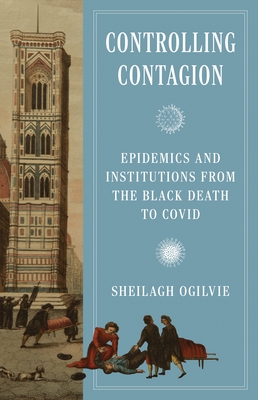

 Princeton University Press
Princeton University Press
Controlling Contagion: Epidemics and Institutions from the Black Death to Covid


Key Metrics
- Sheilagh Ogilvie
- Princeton University Press
- Hardcover
- 9780691255569
- -
- -
- History > World - General
- English
 Secure Transaction
Secure TransactionBook Description
How human institutions--markets, states, communities, religions, guilds and families--have helped both to control and to exacerbate epidemics throughout history.
How do societies tackle epidemic disease? In Controlling Contagio, Sheilagh Ogilvie answers this question by exploring seven centuries of pandemics, from the Black Death to Covid-19. For most of history, infectious diseases have killed many more people than famine or war, and in 2019 they still caused one death in four. Today, we deal with epidemics more successfully than our ancestors managed plague, smallpox, cholera or influenza. But we use many of the same approaches. Long before scientific medicine, human societies coordinated and innovated in response to biological shocks--sometimes well, sometimes badly.
Ogilvie uses historical epidemics to analyze how human societies deal with externalities--situations where my action creates costs or benefits for others beyond those that I myself incur. Social institutions--markets, states, communities, religions, guilds, and families--help us manage the negative externalities of contagion and the positive externalities of social distancing, sanitation, and immunization. Ogilvie shows how each institution enables us to coordinate, innovate and inspire each other to limit contagion. But each institution also has weaknesses that can make things worse. Markets shut down voluntarily during every epidemic in history--but they also brought people together, spreading contagion. States mandated quarantines, sanitation, and immunization--but they also waged war and censored information, exacerbating epidemics. Religions admonished us to avoid infecting our neighbours--but they also preached against science and medical innovations. What decided the outcome, Ogilvie argues, was a temperate state, an adaptable market, and a strong civil society where a diversity of institutions played to their own strengths and checked each other's flaws.
Author Bio
I grew up in the western Canadian city of Calgary, and have since lived in Scotland, Germany, England, the USA and the Czech Republic. I studied at the Universities of St Andrews, Cambridge, and Chicago, and was a Research Fellow at Trinity College Cambridge.
I then taught for 31 years in the Faculty of Economics at the University of Cambridge, before moving to the Chichele Professorship of Economic History at All Souls College Oxford in 2020.
Research Interests
I explore the lives of ordinary people in the past and try to explain how poor economies get richer and improve human well-being. I’m particularly interested in how social institutions – the formal and informal constraints on economic activity – shaped economic development in Europe between the Middle Ages and the present day.
In recent years my publications have analysed guilds, serfdom, communities, the family, gender, human capital investment, consumption, and state capacity.
Source: University of Oxford
Videos






Community reviews
Write a ReviewNo Community reviews